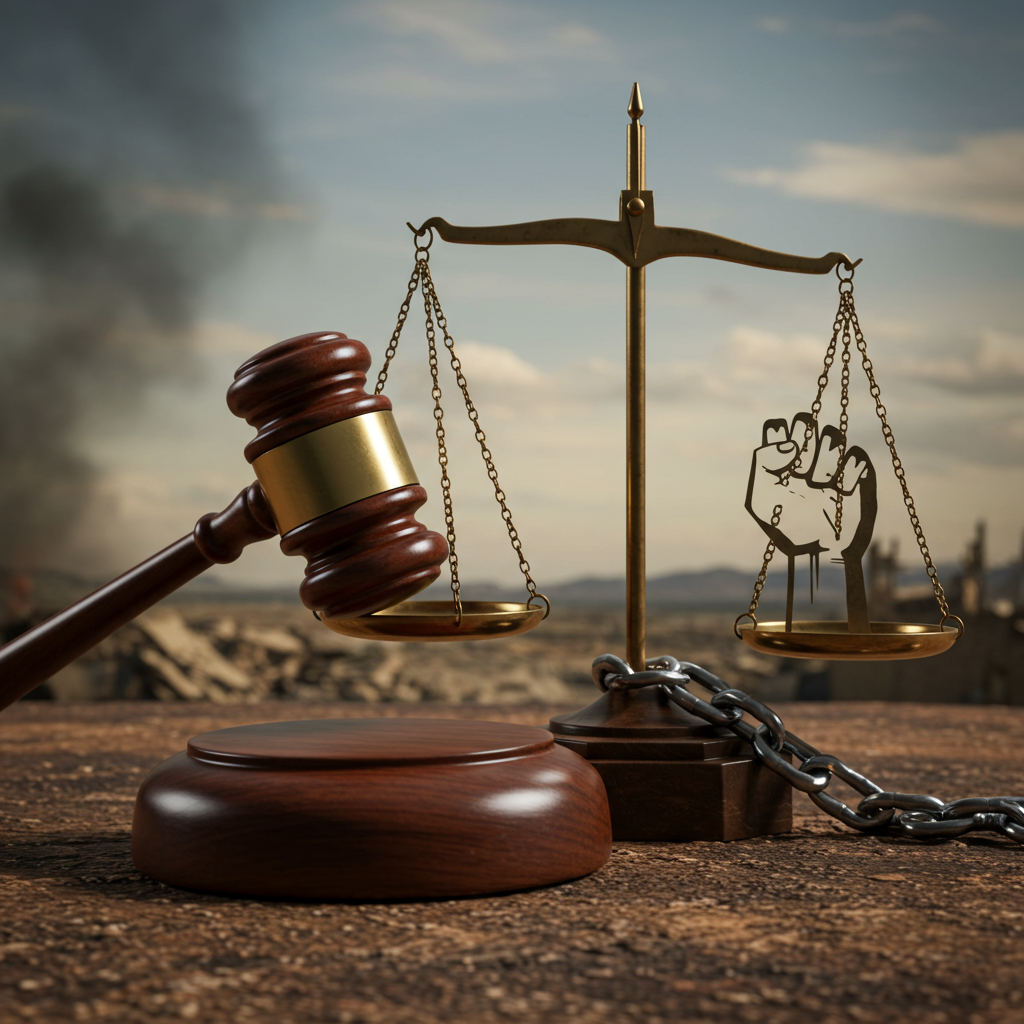In the aftermath of a intense 12-day confrontation involving israel and the United States, Iran is swiftly moving to impose harsher penalties on anyone deemed to be cooperating with foreign governments. This legislative push coincides with official pronouncements of a “historic victory” following the recent ceasefire. However, human rights groups voice deep concerns, highlighting a wave of arrests and executions that underscore a tightening grip on perceived internal dissent and external collaboration in the Islamic Republic. This development signals a significant internal response following a period of unprecedented external military pressure.
Iran Seeks Tougher Penalties for Collaboration
Iranian authorities are actively working to allow for more severe consequences for individuals suspected of collaborating with foreign entities. This effort gained momentum immediately following the ceasefire that ended the recent conflict on Monday. President Masoud Pezeshkian addressed the nation late Tuesday, declaring a “historic victory” for Iran. He asserted that any plans aiming to sow “discord and division” among Iranians would ultimately fail.
Concurrently, both the country’s parliament and its judiciary are advancing initiatives. Their goal is to enforce more serious punishments against actions perceived as detrimental to national security. The timing of these measures is directly linked to the recent hostilities. Officials argue existing laws are insufficient to address contemporary threats.
Proposed Law Targets Espionage and Cooperation
On Monday, the Iranian parliament formally approved a plan to “intensify punishment for espionage and collaborators.” The proposal specifically targets individuals linked with the “Zionist regime [Israel] and hostile countries.” It explicitly mentions actions deemed against national security and interests. This legislative move aims to close loopholes in the current legal framework.
Alireza Salimi, a member of the parliament’s presiding board, elaborated on the proposal. He stated that “any intelligence or espionage activity or practical action” that is seen as favouring Israel, the US, or other specified entities could fall under the new rules. Critically, such actions could potentially be considered an example of “corruption on Earth.” This grave charge carries the possibility of the death penalty in Iran. The legislation also extends its scope. It targets people associated with weapons described as capable of causing “chaos and terror.” Furthermore, it addresses those who receive payment. This includes money, property, or even cryptocurrencies. These payments would be for services rendered to states deemed hostile by Iran. Lawmakers indicated this bill is expected to “give the security forces a freer hand” in pursuing suspected collaborators.
Judiciary spokesperson Asghar Jahangir commented on the situation on state television Tuesday. He acknowledged that Iran’s current law on espionage is too broad. He suggested it might not adequately cover the specific types of espionage Iran believes it currently faces. Jahangir argued that the existing legal framework imposes “restrictions and limitations” on authorities. This hinders their ability to effectively punish individuals arrested during the recent war with Israel.
Arrests and Executions Mount Post-Conflict
The period surrounding and immediately following the 12-day conflict saw a disturbing surge in arrests and executions across Iran. Many of these actions are explicitly linked to alleged collaboration with Israel. On Wednesday morning in Urmia, located in northwest Iran near the Iraqi and Turkish borders, authorities carried out the executions of three Iranian citizens. These individuals were convicted of moharebeh, meaning “waging war against God,” and corruption on Earth. They faced accusations of importing equipment allegedly used to assassinate Iranian officials. While the judiciary did not publicly name the specific figures targeted, these executions are widely believed to be connected. They point to the killing of prominent nuclear scientist Mohsen Fakhrizadeh in November 2020. Israel has been blamed for that assassination.
Since the conflict commenced on June 13, Iran had already executed three other men in separate cases. All were also linked to allegations of spying for Israel. The human cost of the conflict in Iran was significant. Over 600 people reportedly died from Israeli attacks. Many of these strikes, particularly those occurring on the first night that killed several Iranian military commanders, are believed to have relied heavily on Israeli intelligence-gathering operations within Iran.
Local media reported widespread detentions during the 12 days of fighting. At least 700 arrests were made across the country. Authorities have continued announcing more arrests each day since the ceasefire. These detentions span multiple provinces and involve various accusations.
For instance, Amir Kholfian, the prosecutor general of Khuzestan province in southwestern Iran, announced indictments on Wednesday. Charges were issued against 23 individuals there. They faced accusations of “sabotage acts.” These included disseminating “propaganda against the holy establishment of the Islamic Republic of Iran.” Similar cases and arrests have been reported in numerous other provinces. Recent figures include 115 arrests in Kermanshah to the west. Another 53 were detained in Fars province in the south. In Gilan to the north, 36 arrests were made.
Human Rights Concerns Escalate
International human rights organizations have sharply criticized Iran’s actions. Amnesty International issued a statement last week condemning the expedited trials and swift executions. They argue these measures, targeting those accused of collaborating with Israel, reveal a disturbing pattern. Amnesty claims Iranian authorities are “weaponise the death penalty.” The aim, they say, is to assert control and instil fear among the populace.
The global rights monitor specifically raised concerns about individuals already on death row. They face a heightened risk of execution in the current climate. Amnesty highlighted that suspects in such cases often endure “grossly unfair trials.” These legal proceedings frequently fall far short of international standards.
Online Crackdown and Drone Regulations Tighten
Beyond physical arrests and legislative changes, Iranian authorities are also intensifying efforts to control the flow of information. They are specifically cracking down on online activity. Any digital content or interaction that could be interpreted as favouring Israel or the US is now under scrutiny. This includes expressing any form of support for their military strikes on Iran during the recent conflict.
Some Iranian citizens have reported receiving identical text messages. These messages reportedly originated from the crime prevention department of the judiciary. The texts explicitly warn recipients. They state that membership in or even simply following any online accounts affiliated with Israel constitutes a crime punishable by law. The alarming message reportedly reads: “Considering that your number has a record linked with the pages of the Zionist regime, you are warned to remove your supportive comments and likes and immediately leave those pages” or face legal punishment.
Furthermore, the conflict highlighted the extensive use of small unmanned aircraft. Israel reportedly employed explosive quadcopters and other small drones. These were used to strike Iranian targets from inside the country. In response, regulations governing the ownership and use of such aircraft are expected to become significantly tougher. State-linked Fars news agency reported on Wednesday that parliament approved the basic outlines of a plan. This plan will establish specific punishments for individuals found owning unlicensed drones. This aims to curb a perceived intelligence and attack vector used during the war.
Nuclear Program Tensions Flare Amidst Conflict Aftermath
The recent conflict and its fallout have also significantly impacted Iran’s stance on its nuclear program. Parliamentarians emphatically approved a controversial plan. This involves suspending cooperation with the International Atomic Energy Agency (IAEA). Iranian authorities have publicly claimed that the IAEA’s actions somehow paved the way. They suggest the agency’s conduct facilitated US and Israeli strikes on Iran’s nuclear facilities. This claim has been met with international skepticism.
Following the vote on the IAEA cooperation suspension, members of parliament reportedly chanted slogans. They were heard shouting “death to America” and “death to Israel.” Parliament speaker and former military commander Mohammad Bagher Ghalibaf delivered a defiant promise. He vowed that the country would advance its nuclear program even stronger and faster than before. This indicates a hardening of Iran’s position on the nuclear issue in the wake of the attacks. Members of parliament have also voiced support for an even more drastic step. They back the possibility of Iran’s Supreme National Security Council choosing to withdraw from the Nuclear Non-Proliferation Treaty (NPT).
Assessments of the damage inflicted by US strikes on Iran’s nuclear sites during the conflict remain starkly divided. US media outlets, including CNN, reported that US military strikes on Sunday failed to destroy Iranian nuclear facilities deeply buried within mountain sites. This outcome reportedly angered US President Donald Trump. He had insisted publicly that the targeted sites were completely taken out. Conflicting reports emerged, with leaked US intelligence assessments suggesting the strikes might only set back Iran’s program by a matter of months. In contrast, Israeli assessments claimed the damage was severe, causing years of delay. Iran itself, while initially defiant, later saw a foreign ministry spokesperson admit facilities were “badly damaged,” though specifics were avoided.
The IAEA has added another layer of uncertainty. The agency has stated it remains unaware of the precise location of Iran’s stockpile of enriched uranium. This includes over 408 kilograms (approximately 900 pounds) of high-enriched 60 percent uranium. This significant quantity is far beyond levels needed for civilian use and increases international concern.
Iran’s Supreme Leader Ayatollah Ali Khamenei delivered his own defiant message. Speaking publicly after the ceasefire, he unequivocally stated Iran would “never surrender” to the US. Khamenei claimed victory in the conflict. He downplayed the impact of the US strikes, stating they “gained nothing” and “did nothing significant” to the nuclear program, directly contradicting claims made by Trump and Netanyahu. He warned Israel of “further destruction” if it were to attack Iran again and referenced an Iranian missile attack on a US base in Qatar as a “severe slap to the face of America.”
The aftermath reveals a complex picture: while Iran projects an image of victory and defiance, the government simultaneously tightens internal security measures and faces ongoing uncertainty regarding its nuclear capabilities and international standing.
Frequently Asked Questions
What new punishments is Iran proposing for ‘spying’?
Iran’s parliament is advancing a bill to “intensify punishment” for espionage and collaboration with perceived hostile countries like Israel and the US. The proposal includes classifying such actions as “corruption on Earth,” a crime potentially punishable by the death penalty. It specifically targets intelligence activities, actions favouring adversaries, links to disruptive weapons, and receiving payment (including cryptocurrency) for services to hostile states. The judiciary believes current laws are too general for modern espionage threats.
How many arrests and executions have occurred recently in Iran related to these charges?
Since the start of the 12-day conflict on June 13, Iran has executed at least six individuals accused of spying for Israel, including three in Urmia convicted post-ceasefire for alleged roles in assassinations. Authorities have also conducted widespread arrests, with local media reporting over 700 detentions nationwide during the war. Specific recent announcements include 23 indictments in Khuzestan for “sabotage acts” and “propaganda,” plus dozens more arrests in provinces like Kermanshah, Fars, and Gilan.
What is the current status of Iran’s nuclear program after the conflict and related strikes?
Iran’s parliament has voted to suspend cooperation with the IAEA, claiming the agency facilitated US/Israeli strikes. Parliamentarians vowed to accelerate the program and voiced support for potentially leaving the NPT. While US and Israeli officials claimed strikes severely damaged facilities (Trump said “obliterated”), leaked intelligence suggested minimal long-term impact. Iran admitted facilities were “badly damaged” but remains vague on specifics. The IAEA reported “extensive damage” but noted Iran retains technological knowledge. The IAEA also states it does not know the location of Iran’s high-enriched uranium stockpile.
In conclusion, the recent conflict has served as a catalyst for Iran to significantly tighten its internal security measures, specifically targeting individuals suspected of collaboration with foreign adversaries, particularly the US and Israel. The proposed harsher penalties, combined with a documented surge in arrests and executions, signal an increased focus on perceived internal threats following external military confrontation. Concurrently, tensions surrounding Iran’s nuclear program have escalated, marked by steps back from international oversight and conflicting assessments of the impact of recent strikes. These developments collectively portray a nation consolidating power internally while maintaining a defiant stance on the global stage amidst ongoing geopolitical uncertainty.
Word Count Check: 1195




